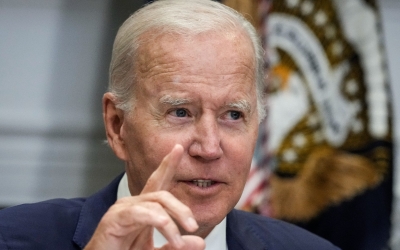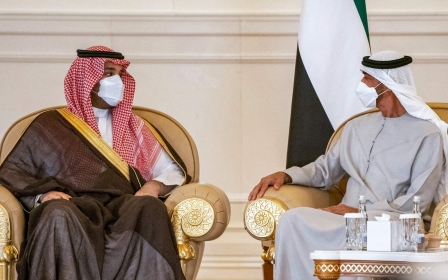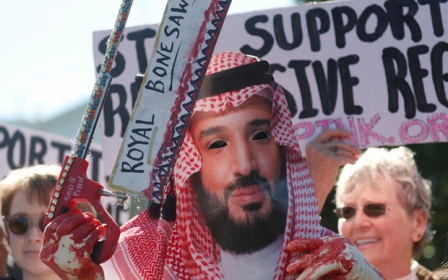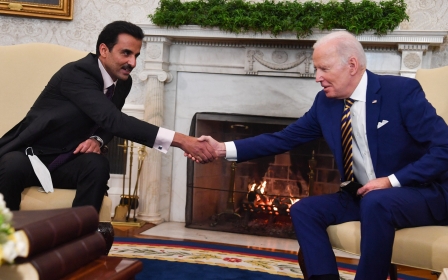Israeli military officials sent to Qatar as US works to bolster security cooperation
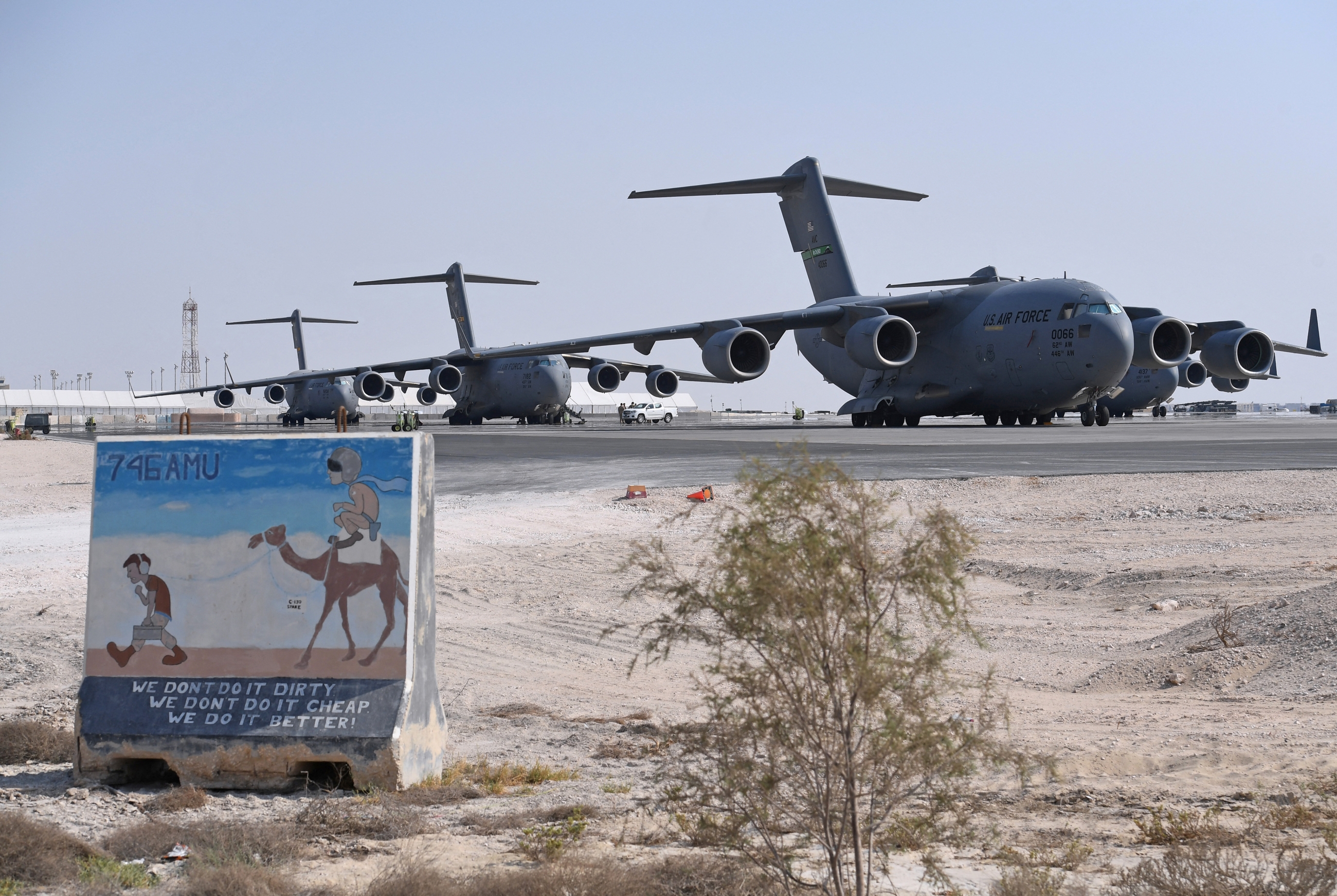
Israeli military officials have secretly been dispatched to Qatar as part of a security reshuffle that places Israel in US Central Command's area of responsibility, current and former US and Gulf officials have told Middle East Eye.
At least one location where Israeli officials have travelled is al-Udeid, a US air base and the forward operating headquarters of all US forces in the Middle East, also known as Centcom, the sources said.
Israel was absorbed into Centcom last year, in a move that built on the 2020 normalisation agreements which saw Bahrain and the UAE establish full diplomatic relations with Israel. Morocco and Sudan normalised relations with Israel soon after.
A Gulf official with knowledge of the matter who spoke with MEE on condition of anonymity to discuss the sensitive topic did not say how many Israeli personnel were currently in the country.
The Abraham Accords and Israel's inclusion in Centcom 'are forcing all Arab capitals to reassess what their relationship with Israel looks like'
- R Clarke Cooper, former US official
Despite lacking formal relations, Israel and Qatar - two key US allies - maintain ties, and are known to engage on issues including the Israeli occupation of Palestinian territories.
New MEE newsletter: Jerusalem Dispatch
Sign up to get the latest insights and analysis on Israel-Palestine, alongside Turkey Unpacked and other MEE newsletters
"There is dialogue, and it is a good dialogue," said the Gulf official.
Qatar publicly acknowledges what it calls a "working relationship" with Israel. Those ties came to the fore during Israel's offensive on Gaza last year when Defence Minister Benny Gantz reportedly met with Qatari officials in an unnamed country to negotiate aid for the besieged Gaza Strip.
However, the disclosure, not previously reported elsewhere, of Israeli military officials travelling to Qatar underscores how ties are extending beyond traditional areas such as Palestine, particularly as the US works to bolster security cooperation between its Arab partners and Israel.
"The Abraham Accords, as well as the inclusion of Israel into the US Central Command, are forcing all Arab capitals to reassess what their relationship with Israel looks like," R Clarke Cooper, former assistant secretary of state for political-military affairs under the Trump administration and currently at the Atlantic Council, told MEE.
"Current considerations of military integration to address shared threats like Iran is a real-time example of such reassessment," he added.
'Exploring greater security coordination'
In March, Qatari military officials - along with those from Saudi Arabia, the UAE, Egypt, and Jordan - reportedly held a meeting with US and Israeli counterparts in the Egyptian resort city of Sharm al-Sheikh to discuss a plan for joint missile defence.
The meeting took place against a backdrop of rising tensions with Iran, as talks to revive the 2015 nuclear deal stall.
In contrast to other Gulf states, Qatar is seen as more supportive of a return to the deal. Qatar shares the world's largest natural gas field with Iran. Its leader, Sheikh Tamim bin Hamad al-Thani, travelled to the Islamic Republic in May in a push to jumpstart stalled talks. Last month, the US and Tehran held indirect negotiations in Doha aimed at reviving the accord.
But Qatar's geographic position also means that it would be vulnerable to any escalation in the region, analysts say.
"The Qataris, like other smaller countries between Saudi Arabia and Iran, are open to exploring greater security coordination with other actors, whether that be Turkey, whether that be Israel as well," Anna Jacobs, a senior analyst on Gulf states at the International Crisis Group, told MEE.
Asked about the stationing of Israeli military officials at US bases in Qatar, Centcom referred MEE to the Israeli military. The Israeli military refused to comment on the topic.
Lt Col Dave Eastburn, US Central Command spokesman, told MEE in a written response that the "easing of tensions between Israel and its Arab neighbors subsequent to the Abraham Accords has provided a strategic opportunity for the United States to align key partners against shared threats in the Middle East, including our partners in Israel".
'Working relationship'
Qatar, a gas-rich country of 2.8 million people, of which only 300,000 are Qatari nationals, has had a complex relationship with Israel.
Qatar was the first country in the Gulf to establish trade relations with Israel. During the Second Intifada, it was reportedly pressured by Saudi Arabia and other states to close its trade office there. A reopened office was subsequently shuttered when Israel launched its 2009 invasion of Gaza.
Qatar has long positioned itself as an advocate of the Palestinian cause. The Al Jazeera Media Network and its affiliates, which are funded by the Government of Qatar, are viewed by many as critical of Israel.
Doha is also close to Hamas, the group that governs the besieged Gaza Strip, and provides hundreds of millions of dollars in aid to Palestinians in both the West Bank and Gaza in coordination with the UN, and with the backing of Israel.
Doha's leverage with Hamas helped it negotiate a ceasefire to last May's fighting which saw more than 260 Palestinians killed in Gaza and the occupied West Bank, and 13 in Israel. Following the truce, Qatar pledged $500m in support of Gaza's reconstruction.
A few months after the ceasefire, Qatar announced new measures to provide aid to impoverished families in Gaza. Defence Minister Benny Gantz praised Doha, stating: "I would like to thank Qatar for taking a positive role as a stabilising actor in the Middle East."
"The Qataris have a win-win situation," Yoel Guzansky, a Gulf expert at the Institute for National Security Studies (INSS) in Tel Aviv, told MEE.
"They are appreciated on the Palestinian street for not normalising. They have good relations with the US and good relations with Israel."
Navigating the grey zone
Biden is scheduled to embark on a four-day trip to the Middle East next week, where he will first visit Israel and the occupied West Bank. The visit will then culminate with a major gathering of regional leaders in the Saudi Arabian port city of Jeddah.
Ahead of Biden's trip, US officials have hinted that new states could take steps to normalise relations with Israel. The US is believed to be negotiating a deal to transfer two Red Sea islands from Egypt to Saudi Arabia, in a move that could eventually pave the way for Riyadh to normalise in the future.
Few expect Qatar to take similar measures.
The State Department denied MEE's request to discuss Qatar and US normalisation efforts. Qatar also didn't respond to requests for comment by the time of publication.
In an interview earlier this year, Qatar's foreign minister ruled out normalising ties with Israel "in the absence of a real commitment to a two-state solution" between the Israelis and Palestinians.
"If I was the Qataris, I would not normalise. And if I was the Israelis, I don't know if I would want them to," Guzansky said, explaining that both sides were so far apart on the Palestinian-Israeli conflict that it was likely in each's favour to keep bilateral ties in a "grey zone".
Navigating that grey zone amid signs that normalisation in the region is proceeding will likely continue to test Qatar's ability to balance the relationship.
Middle East Eye delivers independent and unrivalled coverage and analysis of the Middle East, North Africa and beyond. To learn more about republishing this content and the associated fees, please fill out this form. More about MEE can be found here.



